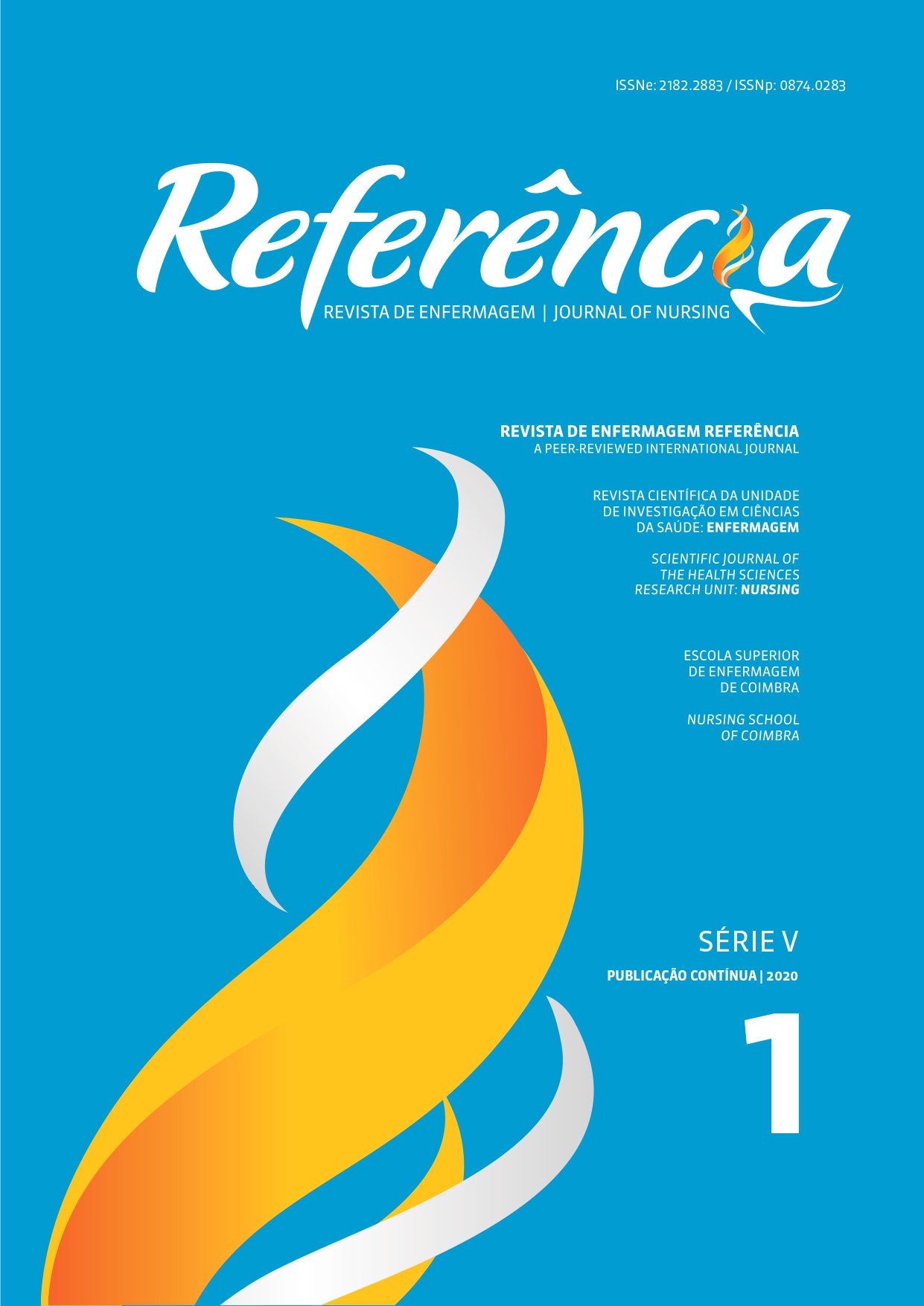Alimentar pessoa: conceção e desenvolvimento de uma ferramenta digital para cuidar de pessoas dependentes
DOI:
https://doi.org/10.12707/RIV19054Palavras-chave:
atividades de vida diária, educação em saúde, ferramentas da e-saúde, cuidadores, autocuidadoResumo
Enquadramento: As plataformas digitais são um recurso na saúde.
Objetivo: O estudo pretende descrever a conceção, desenvolvimento e validação dos conteúdos do tema alimentar pessoa, a integrar numa plataforma digital, destinada a apoiar familiares cuidadores.
Metodologia: A produção de conteúdos foi realizada por um grupo focal que, baseado na literatura e através da metodologia plain language, desenhou o material a incluir na plataforma. O material produzido foi validado por 15 peritos recorrendo à técnica Delphi e posteriormente submetidas a avaliação de 8 cuidadores.
Resultados: Dentição, necessidades nutricionais, hidratação, cuidados a ter antes, durante e depois de alimentar a pessoa, alterações da deglutição e algumas situações especiais foram os conteúdos identificados para dar resposta às necessidades dos cuidadores. A informação foi refinada até que a estrutura e os conteúdos finais apresentassem uma linguagem simples, organização lógica, adequada à população, pouco diferenciada e com baixa literacia em saúde.
Conclusão: Os conteúdos foram considerados facilitadores para uma tomada de decisão fundamentada por parte de quem cuida de pessoas com compromisso no autocuidado alimentar-se.
Downloads
Referências
Cichero, J. (2018). Age-related changes to eating and swallowing impact frailty: Aspiration, choking risk, modified food texture and autonomy of choice. Geriatrics (Basel, Switzerland), 3(4), E69. doi: 10.3390/geriatrics3040069
Costa, B. V. L.., Fonseca, L. M., & Lopes, A. C. S. (2012). Nutritional status and associated factors in institutionalized elderly. Journal of Nutritional Disorders and Therapy, 2(3), 1000116. doi: 10.4172/2161-0509.1000116
Fontão, M. (2017). Contributo de uma ferramenta tecnológica interativa no suporte a familiares cuidadores de pessoas dependentes com compromisso no autocuidado alimentar-se (Dissertação de mestrado), Escola Superior de Enfermagem do Porto, Portugal. Recuperado de https://comum.rcaap.pt/bitstream/10400.26/18948/1/Dissertac%CC%A7a%CC%83o%20Mestrado_Mafalda%20Fonta%CC%83o%20Dias.pdf
Landeiro, M. J. (2015). Tecnologias educacionais interativas: Contributo para o desenvolvimento de conhecimentos dos familiares cuidadores. (Tese de doutoramento). Universidade do Porto, Instituto de Ciências Biomédicas Abel Salazar, Portugal.
Landeiro, M. J., Martins, T., & Peres, H. (2016a). Evaluation of the educational technology caring for dependent people by family caregivers in changes and transfers of patients and tube feeding. Revista Latino Americana de Enfermagem, 24, e2774. doi: 10.1590/1518- 8345.0846.2774
Landeiro, M. J., Martins, T. V., & Peres, H. H. (2016b). Nurses’ perception on the difficulties and information needs of family members caring for a dependent person. Texto e Contexto Enfermagem, 25(1), 1-9. doi: 10.1590/0104-070720160000430015
Landeiro, M. J., Peres, H. H., &. Martins, T. V. (2017). Construction and evaluation of interactive educational technology for family members acting as caregivers on caring for dependent people. Revista Eletrônica de Enfermagem, 19, a13. doi: 10.5216/ree.v19.38115
Landeiro, M. J., Freire, R. M., Martins, M. M., Martins, T. V., & Peres, H. H. (2015). Educational technology in care management: Technological profile of nurses in Portuguese hospitals. Revista da Escola de Enfermagem da USP, 49(Esp. 2), 150-155. doi: 10.1590/S0080-623420150000800021
Lindberg, B., Nilsson, C., Zotterman, D., Söderberg, S., & Skär, L. (2013). Using Information and communication technology in home care for communication between patients, family members, and healthcare professionals: A systematic review. International Journal of Telemedicine and Applications, 3, 461829. doi: 10.1155/2013/461829
Liu, W., Watson, R., & Lou, F. (2014). The Edinburgh Feeding Evaluation in Dementia Scale (EdFED): Cross-cultural validation of the simplified Chinese version in mainland China. Journal of Clinical Nursing, 23(1-2), 45-53. doi: 10.1111/j.1365-2702.2012.04250.x
Lumini, M. J., Araújo, F., & Martins, T. (2018). The role of educational technology in caregiving. In M. Mallaoglu (Ed.), Caregiving and home care (pp. 179-201). doi: 10.5772/intechopen.72887
Osborn, C., & Marshall, M. (1993). Self-feeding performance in nursing home residents. Journal of Gerontological Nursing, 19(3), 7-14. doi: 10.3928/0098-9134-19930301-04
Ministério da Saúde, Administração Central do Sistema de Saúde. (2011). Manual de normas de enfermagem: Procedimentos técnicos (2ª ed). Lisboa, Portugal: Autor.
Rudd, R. E. (2012). Guidelines for creating materials: Resources for developing and assessing materials. Recuperado de https://cdn1.sph.harvard.edu/wp-content/uploads/sites/135/2012/09/resources_for_creating_materials.pdf
Scarparo, A. F., Laus, A. M., Azevedo, A. L., Freitas, M. R., Gabriel, C. S., & Chaves, L. D. (2012). Reflexões sobre o uso da Técnica Delphi em pesquisas a enfermagem. Revista Rene, 13(1), 242-251.
Silva, U., & Tanaka, O. (1999). Técnica Delphi: Identificando as competências gerais do médico e do enfermeiro que atuam em atenção primária de saúde. Revista da Escola de Enfermagem da USP, 33(3), 207-216. doi: 10.1590/S0080-62341999000300001
Souza, J., Martins, M., Franco, F., Martinho, K., & Tinôco, A. (2016). Padrão alimentar de idosos: Caracterização e associação com aspetos socioeconômicos. Revista Brasileira de Geriatria e Gerontologia, 19(6), 970-977. doi: 10.1590/1981-22562016019.160035.
Thimbleby, H. (2013). Technology and the future of healthcare. Journal of Public Health Research, 2(3), e28. doi: 10.4081/jphr.2013.e28

















